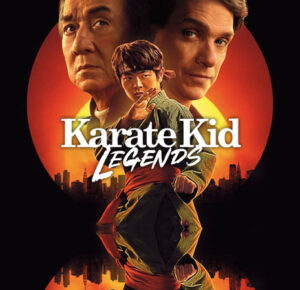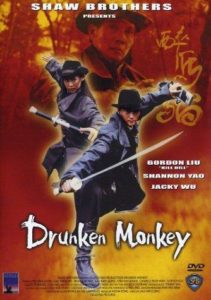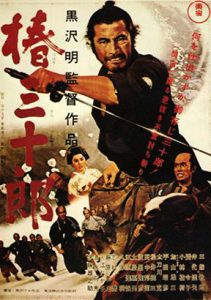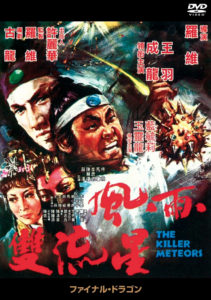Director: Chang Cheh
Cast: Philip Kwok, Chin Siu Ho, Chiang Sheng, Helen Poon, Choh Seung Wan, Wong Lik, Chui Tai Ping, Wang Han Chen, Lau Fong Sai, Chan Hon Kwong, Chan Hung, Chan Shu Kei, Choi Kwok Keung, Chow Kin Ping, Ha Kwok Wing, Hung Fung, Hung San Nam
Running Time: 122 min.
By Joe909
When the kung-fu boom was on the wane, the Venoms and Chang Cheh began experimenting with different types of films. In particular, they made three swordplay movies between 1980 and 1981 that were based on novels: Ode to Gallantry, Sword Stained with Royal Blood, and this movie, Legend of the Fox. Ode to Gallantry is the only Venoms movie I haven’t seen, so I can’t say anything about it. But I can say that Legend and Sword are about as non-Venoms as you can get. In fact, they aren’t even that good.
Since the source material is heavy on character reversals and revelations, these movies seem more like the films of Chor Yuen (i.e. Clans of Intrigue, Magic Blade, etc). The Venoms were never as good actors as they were fighters, so these movies suffer. On top of that, the Venoms just didn’t have the presence of Ti Lung or Fu Sheng. I mean, am I the only one who has difficulty telling Kuo Choi and Chiang Sheng apart, when they’re both outfitted in Ming Dynasty garb and wearing fake moustaches? These guys all pretty much looked alike (and, to quote the oft-repeated story, critics always asked Chang why his Venoms crew was so “ugly”); their forte was action, not drama. Dialog and plot-heavy films did not suit them.
To make matters worse, the Venoms aren’t even the main stars. Chien Hsao-Hao, the naïve-looking “Baby Venom” who had major roles in Masked Avengers and Two Champions of Shaolin, here takes the main role as a young man seeking revenge for the murder of his father, Lu Feng. The opening of the movie features Chien and his dying master encountering all of the major principals of the story in a chance meeting of astronomic proportions. It’s raining out, and apparently this inn provides the only roof in town. So basically EVERYONE gathers under it, including Kuo Choi, whom Chien believes killed his dad, and sinister-looking Chiang Sheng, who we soon learn is the true instigator.
Through flashback we discover that Kuo was duped into challenging Lu Feng; as Kuo himself was out seeking revenge. Really, wasn’t everyone seeking revenge in ancient China? Anyway, Kuo and Lu hit it off, and their sword match lasts days instead of hours. As their bond grows stronger, Chiang Sheng realizes he’ll need to sabotage things so one of them dies. Chiang’s the villain in this movie, and let me tell you, he should’ve stuck to playing comic-relief heroes. Chiang looks about as uncomfortable in this role as he did playing the no-nonsense inspector in Masked Avengers.
If you think it’s strange enough that Chiang Sheng’s a villain, consider it even more strange that Lu Feng is a hero. In fact, Kuo Choi comes off as the villain in their match, but only because he’s been tricked into believing Lu Feng murdered his father. Regardless, Chiang secretly poisons Kuo’s sword, which results in Kuo accidentally killing Lu Feng. Earlier Lu had asked Kuo to raise his infant son should he die in their match, but before Kuo can get the child, a servant grabs him and takes off. This is the old man we see with Chien Hsao-Hao in the opening, who has raised him and taught him kung-fu.
The old man finally tells Chien the truth about his father’s death, before kicking the bucket himself. Now Chien, alone, hunts down Kuo Choi. He manages to save him from assassins, sent by Chiang Sheng, who nonetheless succeed in blinding Kuo. Next Chien goes about finding a way to cure Kuo, and once he has, the two finally take on Chiang Sheng. But the story’s so thick with characters you don’t know doing things you can’t understand, you’ve stopped caring by the final confrontation.
Legend of the Fox is one of the few Venoms movies that wasn’t imported to the West or dubbed in English. Therefore, you can only find it on the underground market, in Mandarin, with English subtitles. Is it worth the search? Depends on your level of Venoms enthusiasm. Once Celestial gets around to remastering and releasing the movie, I’m sure it will be an improvement; the tiny subs on the bootleg print sometimes make it hard to figure out what’s going on.
But even disregarding the poor subtitles, the movie just isn’t compelling. Just like Sword Stained with Royal Blood was a Kuo Choi vehicle, Legend of the Fox is a Chien Hsao-Hao vehicle. But who the hell cares about him? Venoms Lo Meng and Sun Chien are absent from this movie, and either one of them would have been preferable.
The action scenes are few and far between, and when they do come, the Venoms style of acrobatic kung-fu doesn’t mesh well with swordplay. Weapons are relegated to basic swords, and the carnage isn’t as prevalent as usual. Even the final battle is lackluster, although we do get to see a dude chopped in half. Lu Feng only appears in the first fifteen or so minutes, Chiang Sheng basically remains on the fringes of the action, sneering at everyone, and Kuo Choi himself provides more of a supporting, mentor-type role to Chien Hsao-Hao. So those hoping for the usual Venoms camaraderie will be severely disappointed.
Final word: this is my least favorite Venoms movie. Find it only if you need to complete your collection.
Joe909’s Rating: 5/10























2 Comments